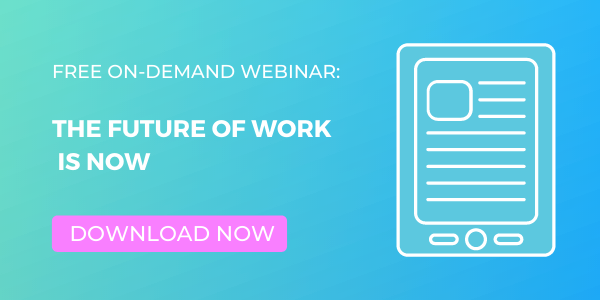The year 2020 has made it clear: the future of work is now. Predictions of what a workforce could look like in five years are the new normal. This acceleration has caused sudden changes in workforce dynamics. It also means new predictions for what the future of work will be in the years to come are up for consideration. Talent acquisition professionals must quickly adapt to the sudden onset of the future of work and begin planning for what’s to come. We sat down with the experts to find out what you should be thinking about now and in the future.
WATCH THIS ON-DEMAND WEBINAR: THE FUTURE OF WORK IS NOW
About the On-Demand Webinar
Leaders from BetterCloud, CultureIQ, Out in Tech and Sales Assembly joined Built In to discuss how companies are adapting to remote work as well as its effect on both short-term and long-term workplace strategies. The conversation spanned from topics of culture, benefit packages, leadership and much more.
Below is a recap of the five things you should takeaway from the conversation. However, there are many other insights that were shared during the live discussion. To hear everything these four experts had to say, download the full, on-demand webinar.

COVID-19’s Affect on Culture
Before we dive into the key takeaways from the webinar, let’s review some of the data that kicked off the discussion. Paul Mastrangelo, one of the experts leading the discussion, shared data from the “CultureIQ 2020 Global Workplace Culture Survey” to show how culture was affected during COVID-19. Here’s what employees had to say:
Compared to two years prior, employees are:
- More willing to put forth extra effort
- Feeling more accomplished
- More satisfied with their employers overall
Employees were more satisfied with their work culture when:
- Policies were created to protect employees
- Access to health benefits increased
- Companies supported customers and the community in need of aid
Employers saw the biggest dip in employee satisfaction in the following categories:
- Employee safety
- Strategic, long-term planning
- Employee development
5 Webinar Takeaways
#1: Organizations Will Become More Remote-Work Tolerant
While remote work was enforced for most organizations and employees due to COVID-19, it doesn’t mean it will remain a full-time benefit in the future. However organizations are likely to become more remote-work tolerant due to the success of this enforced experiment. Each organization will have to make this decision based on its workforce and what is best for the team.
When surveying webinar attendees during the discussion we found that:
- 45% of companies are planning a staggered approach to getting back into the office depending on employee preferences
- 23% of organizations are planning to return to the office in September
- 16% of companies are already back in the office
Despite some organizations already being back in the office and others planning to return, remote work is increasing in popularity for candidates; it is the most searched for benefit across seven of our market sites in 2020 so far. Companies must continue to watch this trend closely, talk to their employees about what they want and decide how they’ll handle remote work in the future based on this information.
#2: Your Culture Doesn’t Have to Suffer Because of Remote Work
Being a connected workplace doesn’t mean you have to physically be in the same place; you can find ways to build a sense of connection between employees even if you’re only interacting remotely. What will make your culture great, no matter if you’re in the office or not, is creating shared experiences for your workforce. Tap into the culture you built in the office as well as your core values to make this happen. What you did in the office to build this sense of community can be done virtually, you just have to get a little creative to make it happen.
#3: It’s Time for Culture to be Redefined
The ideals that have been passed down from leaders before you regarding what makes an organization a great place to work are no longer the answer. Our world is changing at breakneck speed and unprecedented activism is now the norm. You must take a step back to assess your own company and reevaluate if you're on track with the times. Without this necessary introspection and change, you’ll struggle to move forward and connect with talent in the future.
#4: Work & Personal Lives Are No Longer Separate
With the unprecedented activism we are seeing also comes the reality that work and personal lives are no longer separate. People want to be their whole, true selves at work which requires companies to take a stance on what they believe in and how they are going to support employees who have these same beliefs. You must invest in your company’s mission and what you believe in as an organization to connect with the candidates of tomorrow.
#5: Benefit Desires Are Shifting
No longer are free lunches and a ping pong table going to win over candidates and your workforce. Employees today care less about tangible benefits and more about ones that support their mental and physical well-being. Companies must think about how they can help employees be more happy and productive. One thing to consider with future benefit packages is the ability to make them more customizable. Give employees the options to choose what they want instead of just giving them a one-size-fits-all solution.
When it comes to the future of work, things are constantly changing. It's a talent professional’s job to stay abreast of the latest trends and desires of their workforce. Not paying attention to these ever-evolving needs will put your company behind; you’ll struggle to retain current employees and hire great talent. Instead, make conversations about the future of work a normal part of your responsibilities so your organization is constantly adapting to meet the needs of your workforce now and your workforce of the future.
WATCH THIS ON-DEMAND WEBINAR: THE FUTURE OF WORK IS NOW




